FERMENTED FOODS for
HEALTH
Use the Power of Probiotic Foods to Improve Your Digestion, Strengthen Your Immunity, and Prevent Illness
DEIRDRE RAWLINGS, Ph.D., N.D.

2013 Fair Winds Press
Text 2013 Deirdre Rawlings, Ph.D., N.D.
Photography 2013 Fair Winds Press
First published in the USA in 2013 by
Fair Winds Press, a member of
Quayside Publishing Group
100 Cummings Center
Suite 406-L
Beverly, MA 01915-6101
www.fairwindspress.com
All rights reserved. No part of this book may be reproduced or utilized, in any form or by any means, electronic or mechanical, without prior permission in writing from the publisher.
17 16 15 14 13 1 2 3 4 5
Digital edition published in 2013
Digital Edition: 978-1-61058-744-0
Softcover Edition: 978-1-59233-552-7
Library of Congress Cataloging-in-Publication Data available
Cover design by Kathie Alexander
Book design by Kathie Alexander
Photography by Glenn Scott Photography
Food Styling by Alisa Neely
Preparation of fermented foods by Liz Walkowicz
The information in this book is for educational purposes only. It is not intended to replace the advice of a physician or medical practitioner. Please see your health care provider before beginning any new health program.
CONTENTS
Introduction
As far back as recorded history will take us, we find evidence that humans ate microbiologically fermented foods. Scientists recognized the health benefits associated with fermented foods when Nobel Prizewinning Russian microbiologist Dr. Elie Metchnikoff (18451916) credited these foods with boosting immunity and longevity.
Metchnikoff believed that, when consumed, the fermenting Bacillus (Lactobacillus) positively influenced the microflora of the colon, decreased toxic microbial activities, and improved immunity. He named it Lactobacillus bulgaricus after the long-lived, yogurt-loving Bulgarian peasants he studied, and he advocated the wide therapeutic use of these life-giving microorganisms throughout Europe. After Metchnikoffs death in 1916, interest in his work on the fermented food phenomena waned as scientists focused on modern therapies such as antibiotics and immunization programs to conquer infectious diseases.
The problem with these modern therapies is that bacteria and viruses are extremely adaptable, and with our efforts to eradicate them, we have pushed them to evolve into stronger adversaries. With the wide use of antibiotics, both in humans and in animals, bacteria has had to undergo rapid mutations in order to evade such strategies, thus making the body more prone to secondary infections. Currently, in the United States alone, 190 million doses of antibiotics are administered each day in hospitals, and more than 133 million courses of antibiotics are prescribed by doctors to non-hospitalized patients each year. One of the major concerns with the inappropriate or overuse of antibiotics is that they may kill the beneficial bacteria that guard our immune systems, opening the door for harmful bacteria to establish themselves in their place. Once this happens, our immune defenses are weakened and our bodies are vulnerable to disease and illness.
Fortunately, there is hope. Consuming probiotic-rich fermented foods is one of the most effective ways we can address these problems and strengthen our immunity against disease to win back our health. When we consume the right nourishment for our bodies structure, function, and ultimate wellness, good health naturally follows, and fermented foods hold the keys to improved health.
Throughout this book, well look at the numerous health benefits from consuming fermented foods and how you can safely use them to proactively address immune disorders, digestive problems, psychiatric disorders, and other chronic conditions to positively influence your health and longevity. Ive also included a selection of my familys favorite recipes to help start you on your path to wellness.
PART 1
THE MEDICINAL MAGIC OF FERMENTATION

CHAPTER 1
What Is Fermentation?
Let food be thy medicine, and medicine be thy food.
HIPPOCRATES
When Hippocrates first made the statement that opens this chapter, he may well have been referring to the medicinal magic of fermented foods. Fermentation isnt a new practice; in fact, it began many centuries ago, making it one of the oldest methods to both preserve and prepare food. Essentially, fermentation facilitated our shift from being solely hunters and gatherers to becoming an agricultural society. The advent of food preservation techniques enabled people to create a future in one place, within a community, because they no longer had to constantly hunt for food.
Fermentation dates back to 5400 BCE with winemaking in Iran, milk fermentation in Babylon circa 5000 BCE, lacto-fermented cabbage in China circa 4000 BCE, leaven (now known as yeast) to raise bread dough in Egypt circa 3000 BCE, and pulquethe oldest alcoholic beverage on the North American continentin Mexico circa 2000 BCE.
The health benefits from eating fermented foods have been known for centuries. In 76 CE, Roman historian Plinio suggested that fermented milk alleviated gastrointestinal infections. Indeed, Romans obtained the medicinal benefits of lacto-fermented vegetables by eating sauerkraut. Voyagers, from the Roman emperor Tiberius in the first century CE to Captain James Cook in the late eighteen century, relied on sauerkraut to protect their crews from certain intestinal infections and diseases, such as scurvy caused by vitamin C deficiency. Because these voyageurs exported the process around the world, lacto-fermented vegetables include such traditional foods as cabbage in Asia, chutney in India, and relish in America.
The positive health benefits result from the life force inherent in fermented foods: probiotics. Probiotics, which actually means for life, are living microorganisms that confer a health benefit when consumed in the appropriate amount (more on this later). They manufacture vitamins, especially B complex vitamins such as niacin, biotin, folic acid, and pyridoxine, which support and increase the rate of metabolism; detoxify chemicals; promote cell growth including that of the red blood cells that help prevent anemia; and enhance immune and nervous system function. Probiotics increase the production of enzymes, which improves assimilation and absorption of nutrients from food, particularly proteins and fats. They are especially effective in crowding out growth of pathogenic microorganisms, thereby boosting immune system response.
 Fermentation Spans the Globe
Fermentation Spans the Globe
The art of fermentation has been core to civilizations across the world for millennia. Traditional fermented foods have formed a stable component of these diverse diets. Worldwide, people enjoy beers and wines, breads, cheeses, and vinegarsall the products of fermentation. But many cultures have a distinctive fermented food thats a fundamental part of their diets: sauerkraut in Central Europe, kimchi in Korea, miso in Japan, olives and cured meats in the Mediterranean countries, yogurt and chutney in India, pickled herring in Scandinavia, Vegemite in Australia, tarama (fermented roe) in the Far Eastern countries, and lets not overlook pickles and sourdough bread in the United States.
THE PROCESS OF FERMENTATION
Next page

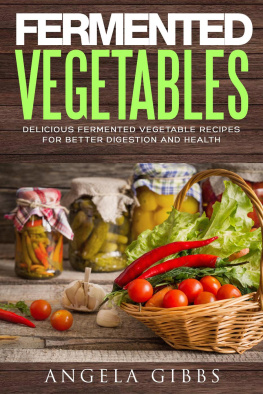
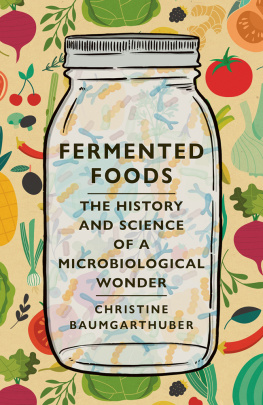
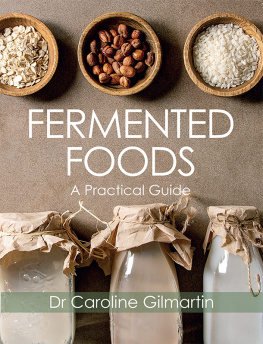
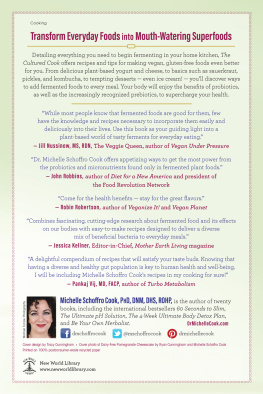
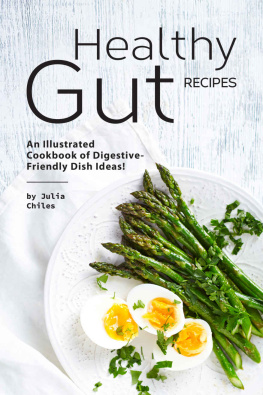

 CHAPTER 1
CHAPTER 1 Fermentation Spans the Globe
Fermentation Spans the Globe